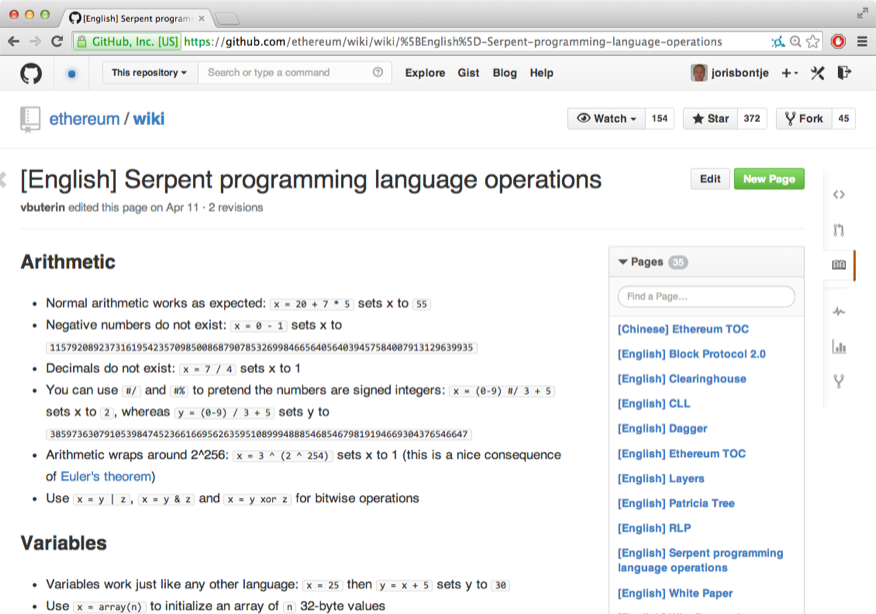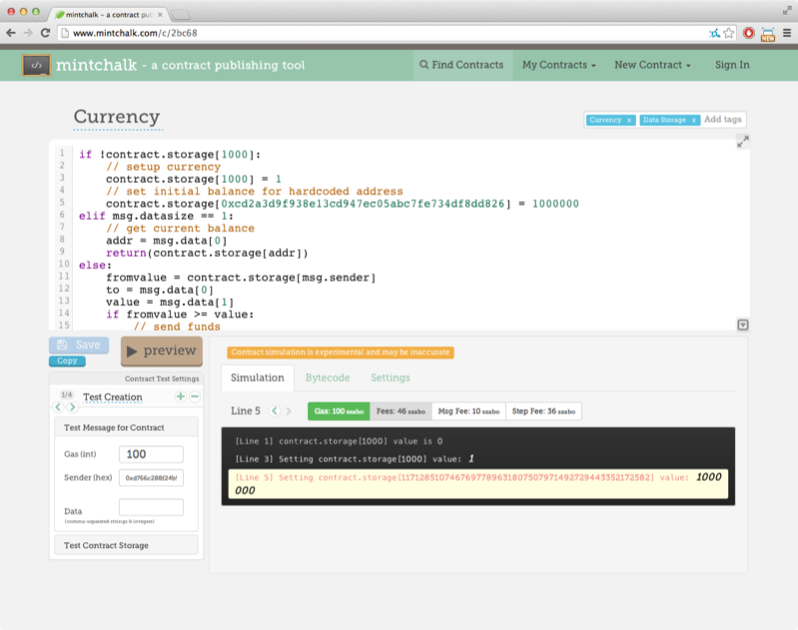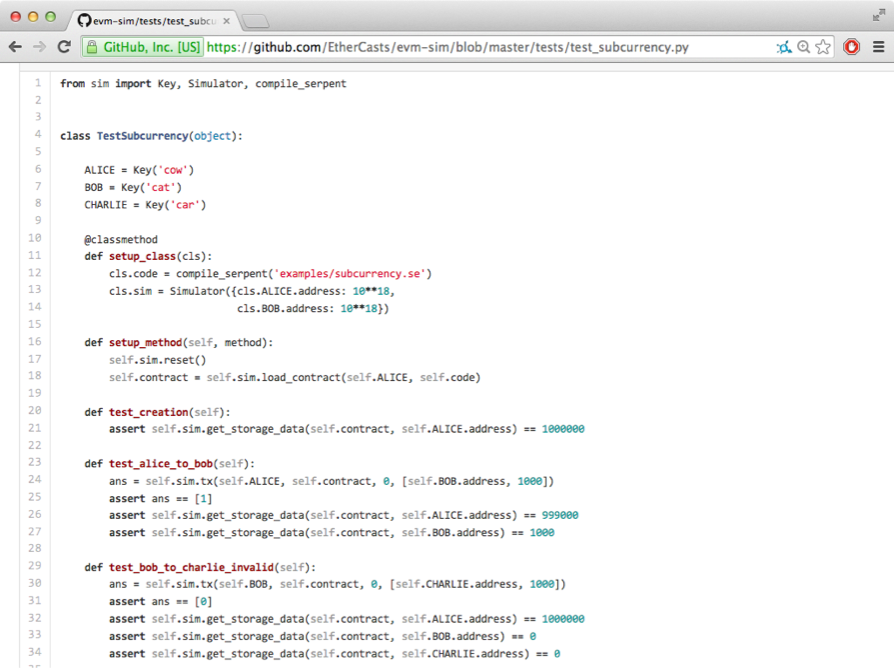Ethereum Training
Serpent
Ethereum POC5 (well, almost...)
- Serpent syntax pretty much like Python
- Stand-alone compiler serpent
- Compiler build into AlethZero, Ethereal, EthereumJ
- Web based testing tool - mintchalk.com
wiki.ethereum.org

Example: subcurrency.se
init:
contract.storage[msg.sender] = 1000000
code:
if msg.datasize == 1:
addr = msg.data[0]
return(contract.storage[addr])
else:
from = msg.sender
fromvalue = contract.storage[from]
to = msg.data[0]
value = msg.data[1]
if fromvalue >= value:
contract.storage[from] = fromvalue - value
contract.storage[to] = contract.storage[to] + value
return(1)
else:
return(0)
Syntax
Program Structure
init:
executed upon contract creation
shared:
constants etc
code:
contract body as stored in the block chain
Comments
x = 4 // this is a comment and does
// not appear in the compiled code
# can also comment with a hash like this
/* this style is not supported however */
Arithmetic (1/2)
- Normal arithmetic works as expected:
x = 20 + 7 * 5setsxto55 - Negative numbers do not exist:
x = 0 - 1setsxto11579208923731619542357098500868790785326998466564 0564039457584007913129639935(which is2^256 - 1) - Decimals do not exist:
x = 7 / 4setsxto1
Arithmetic (2/2)
- You can use
#/and#%to pretend the numbers are signed integers:x = (0-9) #/ 3 + 5setsxto2, whereasy = (0-9) / 3 + 5setsyto38597363079105398474523661669562635951089994 888546854679819194669304376546647 - Arithmetic wraps around 2^256:
x = 3 ^ (2 ^ 254)setsxto1 - Use
x = y | z,x = y & zandx = y xor zfor bitwise operations
Variables / Arrays
- Variables work just like any other language:
x = 25theny = x + 5setsyto30 - Use
x = array(n)to initialize an array ofn32-byte values - Use
x[i] = vto set values in arrays andv = x[i]to get values in arrays - Use array literals to declare arrays inline:
x = [1,2,3]
Byte arrays
- Use
x = bytes(n)to initialize a string/bytearray ofnbytes - Use
setch(x,i,v)to set the byte at positioniof byte arrayxto valuev - Use
v = getch(x,i)to get the byte at positioniof byte arrayx - Variables are stored in the EVM memory, you pay a fee for expanding its size.
Conditions and loops
if,elif,elseandwhilelike Python
if x > 5:
y = 7
x = 248
while x > 1:
if (x % 2) == 0:
x = x / 2
else:
x = 3 * x + 1
Pseudovariables
Pseudovariables block
block.prevhash- previous block hashblock.number- block numberblock.timestamp- block timestampblock.difficulty- block difficultyblock.coinbase- address of block minerblock.gaslimit- maximum amount of gas that can be spent in the block
Pseudovariables tx
tx.gasprice- amount paid by transaction for gastx.origin- original sender of transaction (NOT the sender of the current message, which is different in a nested call situation)tx.gas- current amount of gas remaining
Pseudovariables msg
msg.sender- sender of the messagemsg.value- value of the messagemsg.datasize- length of the data provided by the message, measured as the number of complete 32-byte chunksmsg.data[i]- thei-th 32-byte chunk in message data
Pseudovariables contract
contract.address- address of the contractcontract.balance- balance of the contractcontract.storage[i]- the contract's long term storage, at indexi
Functions
Transactions
send(to, value)- sendsvalueether totosend(gas, to, value)- same, allowing the computation the given amount ofgas.x = msg(gas, to, value, datastart, datalen)- sends a message toto, using the data at memory indicesdatastart...datastart+datalen*32-1, with the given amount of ether andgas, and setsxto the first 32 bytes of the result.x = msg(gas, to, value, datastart, datalen, outputlen)- sends a message toto, using the data at memory indicesdatastart...datastart+datalen*32-1, with the given amount of ether andgas, and pastes outputlen times 32 bytes to the variablex
Contract creation
x = create(f)- creates a new contract using code from filef, and return the address of the contractx = create(endowment, f)- same with endowment
Halting
stop- this keyword by itself on one line stops executionreturn(x)- returns the 32 bytes of valuexreturn(memstart, len)- returns the memory at indicesmemstart ... memstart+32*len-1suicide(a)- destroys the contract, sending all remaining balance toa
Miscellaneous
x = sha3(v)- returns the SHA3 of the given 32-byte valuex = byte(y,z)- setsxto thez-th byte ofyinset(f)- inline the content of another Serpent file
Simulators
mintchalk.com

evm-sim

What's next?
⇒ Try Serpent
Questions / Feedback?